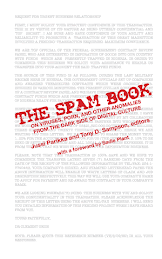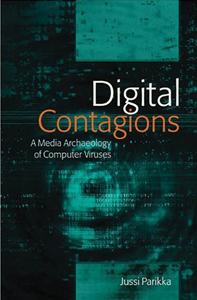David Skinner pulled together with Claire Preston a very nice event at Anglia on Thursday on Trust, Identity and Security. Even if my particular area relating to software and security was not that much covered, the themes interlinked well with some stuff I have been thinking. In terms of such notions of social "glue" as trust, Marek Kohn kicked off with a very general take on the social basis of trust --- although having said "social basis" I need to flag that I was left a bit cold with the too individualized/atomized image of trust that he painted. Too much of the presentation focused on trust outside its historical and institutional settings, using examples that implied it more as a psychological/rationalized/cognitive theme. I disagree with this quite strongly, and was hoping for a discussion more focused on the affective/non-cognitive politics and management of trust in terms of network culture.
In short, my point: a) trust is something guaranteed as a temporal relation in modernity by institutions, b) such institutions have been forced to change and their ability to guarantee the secured future has suffered during what different commentators would call late-capitalism, postmodernity, or for example network culture. This applies to social relations, production and legitimacy of knowledge, economic relations, and huge amount of other key factors. c) Instead of a cognitive relation, institutions have already historically worked on trust as a management of affective states, to put it a bit too broadly. What I mean is that trust works on automation most of the time -- its not a cognitive relation of weighting wins and losses. Its an affective relation that involves the management of futurity as something present; a creation of a condition where future seems as if already present and controllable.
In the other session, presentions by for example David Skinner and Greg Elmer touched interestingly also the topic of futurity. David's talk was on the UK police DNA Database, and very spot on in terms of control through information; not only a creation of "traces" through DNA collection etc., but also through active creation of profiled, targeted "problem groups" -- which happens to be very racially loaded practice. The already existing amount of profiles on the database is very much geared towards collecting from the black communities and through "preemptive profiling", very problematic self-realizing groupings are created. Preempting as a political tool is a good idea/concept that Greg Elmer has been developing (also together with Andy Opel in their book on the topic.) In his video talk, Greg talked about both the concept as one of management of futures, and also on the ongoing online collaboration to create a documentary on the topic. What is preemption? Its about shooting first, asking later -- a practice enabled by a range of non-lethal weapons such as tasers; but also more discursively a mode of governing the present through reacting to "inevitable futures" (where risks are treated as if inevitable events, and hence in need of preemptive actions.) This is the logic of the Bush regime in a way, but not limited to a set of tools by the ex-US Government (and also having clear connections with e.g. Richard Grusin's notion of premediation).
The day ended with Sean Cubitt's different angle to the topic of databases and security. He gave a brilliant genealogy of management of colors and perception through the histories of the raster screen. The same mode of cutting and organizing perception into discreet units that governs the raster screen approach is apparent according to Cubitt also in the database mode of governing through creating units that are inter-exchangeable etc. In a way, I was after Skinner's presentation thinking about how modes of racism and racial profile have moved from the visual regime of e.g. orientalism to the informatics of databases and hence non-visual media, but actually Cubitt made me rethink and realize the possible connections between visual and database media. The technicality inherent in modes of management of perception are already hinting towards the logic of computational databases, seems Cubitt to argue and I have to admit his points were quite convincing even if I am not usually the first person to argue for the centrality of the visual in media cultures (esp. technical).
Subscribe to:
Post Comments (Atom)








A great commentary on the day - thanks. Yes I was surprised how many others in the audience with an interest in privacy/security saw little problematic in Marek’s approach. Ditto Ross Anderson (who you do not discuss) who despite his great technical expertise and his political influence is no social scientist!What is it with privacy campaigners and evolutionary psychology?
ReplyDeleteYour paragraph on trust and systems seems to make sense as a way of understanding the level of political, economic and organisational effort invested in forensic databases – here is a truth machine that will secure our future security and rescue the credibility of the criminal justice system.
Sean Cubitt’s talk was brilliant – discussion of the presentation and packaging of information opens up new avenues for me in the study of DNA.
Thanks for the comments David, very good addition!! Yes, I neglected Ross without a reason; was trying to finish this a bit quickly...he made the important link by transposing trust/security issues into technical matters. I liked some of the points, but found indeed the social dimensions so to speak undeveloped. Good point re. forensic databases, and if I was not that tired yesterday, would have written more about yours, Greg's and Sean's work.
ReplyDeleteI too loved the visual culture/media tech perspectives Sean brought in.
Would be great if we can continue with some security interests, databases etc. Would love to work on some of those topics, and get more researchers in working on them.
The symposium raised some interesting issues on the relationship between trust, the individual and digital society. Ross Anderson’s talk painted rather a scary future where information on individuals becomes increasingly digitised into larger databases, with the goal of efficiency. This seems to increase risk to the individual as these ‘secure’ databases are handled by larger groups of people/departments less likely to retain confidentiality and anonymity. I am a sociologist and I believe in society and yet where is society when an individual’s digital record is revealed, as occurred in the I V Finland case. It was an individual who fought against the institution with the result of the ECHJ ruling.
ReplyDeleteThe day also provoked some reflections on society and its digital future. It is belived that in late capitalism trust is being lost in institutions, that in previous times provided security. This has resulted in ‘anomie’ or an atomised society; where individuals guard their security for themselves with scant regard for fellow humans. And yet, at the same time our network cultures and the reach of institutions is growing with the help of technology – and maybe that’s where we find society; in the grip of large corporations who have washed their hands of atomised individuals.
Videos of the talks available at:
ReplyDeletehttp://barney.inspire.anglia.ac.uk/inspire_j/ds1.html